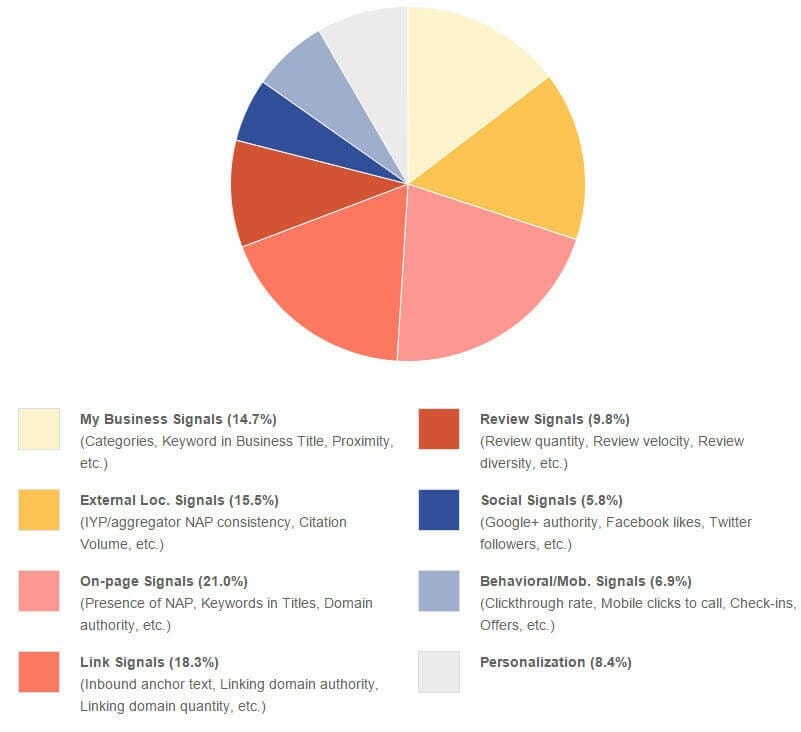As you begin to gear up for a successful 2017 for your business, one very important thing you need to address is your local SEO. Here are a few key local SEO facts you should know:
- The Google 2-pack (which is Google’s organic listing of two local businesses) appears at the top of 93 percent of all searches with local intent.
- 60 percent of American adults search for local product and service information.
- 50 percent of people who conduct a local search on their Smartphone, and 34 percent of people who conduct a search on their computer/tablet, will visit a store within a day.
- A whopping 46 percent of all searches on Google are local.
Local SEO is so significant that almost half of all Google searches are local, and it will become even more significant in 2017. However, the following mistakes will completely jeopardize your local SEO efforts.
1. Unavailable, Inaccurate or Inconsistent NAP Information
NAP is an acronym for Name, Address, and Phone Number, and it is one of the core metrics Google uses to rank local businesses in its search results. Not only is it important to have your NAP information publicly and prominently displayed on your website, but it is also important that this information is consistent. Several sources agree that Google and other search engines cross check your NAP information with several other sites — this includes on your Google My Business page, Yelp, Internet Yellow Pages, and local directories. This tool from Moz can help analyze your website to see if you will have any issues.
Besides the fact that working on your NAP will improve your SEO, it is also important to note that having accurate and up to date NAP information will improve your sales and conversions. Here’s why:
- 86 percent of people look up the location of a business on Google Maps
- 76 percent of local searches will result in a phone call
2. Claim Your Google My Business Page
One of the most important things you can do when trying to rank well in local SEO, specifically with the Google search engine, is to claim your Google My Business page. In fact, this is so important that it accounts for about a significant 14.7 percent of local ranking signals.

When it comes to local SEO, the information Google uses to rank your website — and that it displays to people in local results — mainly comes from your My Business page, not from your website. You can set up your My Business page directly with Google, but it is important to verify your listing so that nobody else is able to edit your page in the future.
Once you set up your My Business page, it is important to ensure it includes a proper and unique description of your business, that your business is properly categorized, that there are a local phone number and address accompanying your listing and that is consistent elsewhere online, and that you upload as many relevant photos for your business.
3. Get Local Reviews
One of the essential factors that impact your local SEO is reviews — the more high quality, high quantity and high diversity reviews you get, the better for your local SEO.
For a start, once your My Business page has been created, reach out to existing customers and friends, reach out to people on your email list, reach out to people through your blog, who have experience with your business and ask them to leave a genuine review — you could even give them the incentive to leave a review. Because review signals account for about 9.8 percent of local ranking factors, getting good quality reviews will give you some serious local SEO boost.
4. Ignoring Normal SEO Ranking Factors
As you’ve probably seen, local SEO is a different ballgame from normal SEO — it is very dangerous to assume that it is entirely different, though. A lot of factors that influence normal SEO also influence local SEO. For example:
- Domain authority: All things being equal, a business with high domain authority will rank much better than a business with low domain authority. Work on improving your domain authority by working on gaining quality internal and external links.
- Backlinks: Backlinks are also super essential to successful local SEO. Factors like the quality, the quantity and the diversity of your backlinks will go a long way to impact your local SEO. If you don’t have a link building strategy in place, it’s essential to start one.
- Search results in CTR: Just as with normal SEO, Google, and other search engines observe the click-through rate to your website from the search results pages to see how your website and business resonate with searchers. This is a signal to work on your on-page SEO such as meta signals that are shown to people in the search results.
5. Ignoring Negative Local Ranking Factors
It is also important to realize that there are negative factors that can jeopardize the ranking of your local business in search results pages. You don’t want to ignore these factors, too:
- Having your business listed in an incorrect category in your My Business page can have a negative impact on your local SEO.
- Having a false business address, incorrect phone number or an address and phone number inconsistent with that found elsewhere online can seriously, negatively affect your rankings.
- Having malware on your site can damage your local SEO.
- It is also important to avoid using PO Boxes, UPS Mail Store addresses, and other similar addresses. Google and other search engines will only recognize real addresses.
Negative My Business reviews can also affect your local rankings. While review diversity is important, overly negative reviews will jeopardize your local SEO.
About the Author
 John Stevens is founder and CEO of Hosting Facts. He regularly contributes to Entrepreneur, Adweek, and other major publications. When he is not busy directing affairs at the various companies he manages, he is probably digging up facts and research on how to be a more efficient human.
John Stevens is founder and CEO of Hosting Facts. He regularly contributes to Entrepreneur, Adweek, and other major publications. When he is not busy directing affairs at the various companies he manages, he is probably digging up facts and research on how to be a more efficient human.
Like this month’s theme? We are sharing even more about how small businesses can grow with SEO over at www.SEOforGrowth.com.

